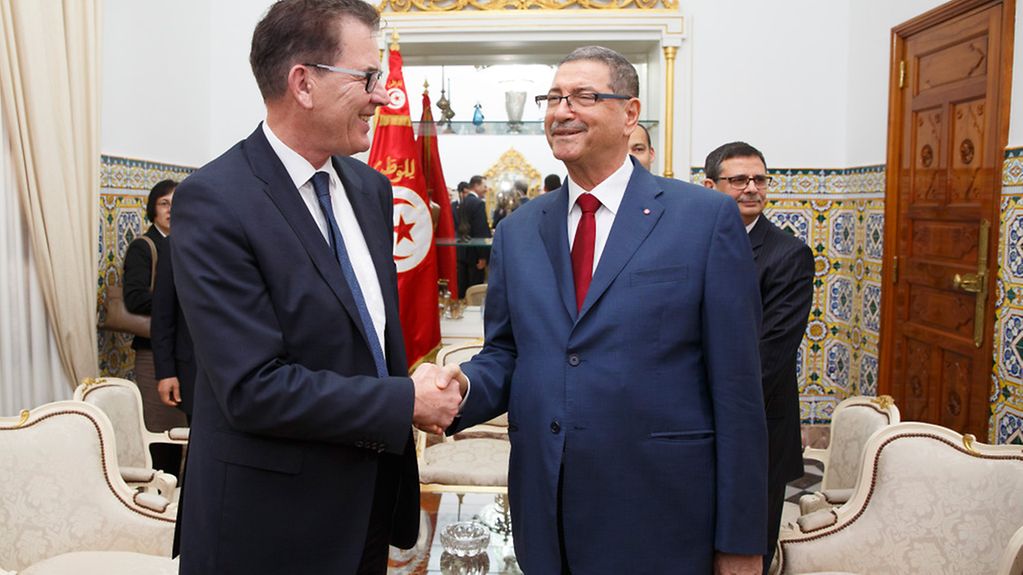Gerd Müller visits Maghreb states
Against the background of the refugee crisis, Federal Development Minister Gerd Müller has been visiting Morocco, Algeria and Tunisia for talks. A new economic partnership with North Africa was on the agenda, along with German support for African returnees and the need to offer young African genuine prospects of a better future.
3 min reading time

Gerd Müller in discussion with Tunisian Prime Minister Habib Essid
Photo: Ute Grabowsky / photothek.net
German development cooperation aims to stabilise the North African states in both political and economic terms. "If we do not manage to provide the support the Mediterranean states of North Africa need in the process of societal transition, the people will set off to find a better future in Europe," said Federal Development Minister Gerd Müller.
New training and economic cooperation arrangements
Federal Development Minister Gerd Müller has held numerous meetings in Morocco, Algeria and Tunisia with business representatives. Training and economic cooperation arrangements have been agreed. He also discussed the contribution Germany can make in innovative areas, including renewable energy and university education. Another item on the agenda was the integration of immigrants from sub-Saharan states in North Africa.
"We are working on a new Mediterranean economic cooperation scheme. The Mediterranean does not separate us from North Africa – it brings us together and it is a bridge for a successful partnership," said Gerd Müller following a meeting with Tunisian Prime Minister Habib Essid.
He continued, "Currently, 250 German companies already operate in Tunisia. We will be expanding this engagement, stepping up investment and triggering economic development. A Mediterranean cooperation arrangement of this sort creates jobs and opportunities, especially for the young people of North Africa."
Reintegration of returnees
The minister’s talks also looked at ways of improving the return of unsuccessful asylum-seekers to their home countries. Within the scope of development cooperation, Germany will support the reintegration of returnees in their home countries. Gerd Muller said, "German development cooperation can offer a wide range of options in this context thanks to its long-standing structures."
German private-sector investment in Morocco
The solar power plant built by Germany and Morocco in Ouarzazate is the largest of its sort anywhere in the world. Today it already supplies 350,000 people with green power, creates jobs, liberates Morocco from its dependence on imported energy and protects the climate. Gerd Müller and Morocco’s Minister of Energy agreed on another cooperation arrangement in this dynamic, forward-looking area.
In Rabat, Morocco’s capital, the delegation visited an integration centre built with German support, which offers a point of contact for immigrants from sub-Saharan Africa. Germany intends to extend welcome centres of this sort to another ten municipalities, thus helping tens of thousands of immigrants from sub-Saharan Africa to integrate.
Prospects for talented young people
In Algeria, Germany is actively involved in the Pan African University in Tlemcen, which offers young people from across Africa an education. Federal Development Minister Gerd Müller opened a new institute which will offer professional training in the field of renewable energies, among other courses.
"Education and training offers talented young people genuine prospects and strengthens Africa as the continent of the future. We can thus halt the trend that more and more well trained young African leave their home continent, because they can see no future there. The Pan African University is one example, which must be followed by many other universities and cooperation arrangements between Africa and Europe," stressed Gerd Müller.
The minister urges Europe to act
In Tunisia talks focused, among other things, on the decline of the tourism industry in the wake of the terrorist attacks in Tunisia. Economic cooperation with Germany thus spotlights primarily employment. Water supply and the establishment of administrative structures in rural areas were also discussed.
Overall, German-Tunisian cooperation has already provided half a million people in Tunisia with safe drinking water. Over and above this, investment in public infrastructure has enabled more than 100,000 people to find a job. Cooperation in the digital sector is to be stepped up.
Gerd Müller said, "The key to solving the refugee crisis is here in the countries themselves. We can work with the private sector to develop a massive economic and investment programme in North Africa. Every euro we invest there has an impact that is many times greater. If Europe does not decide to act at last, we will pay dearly."